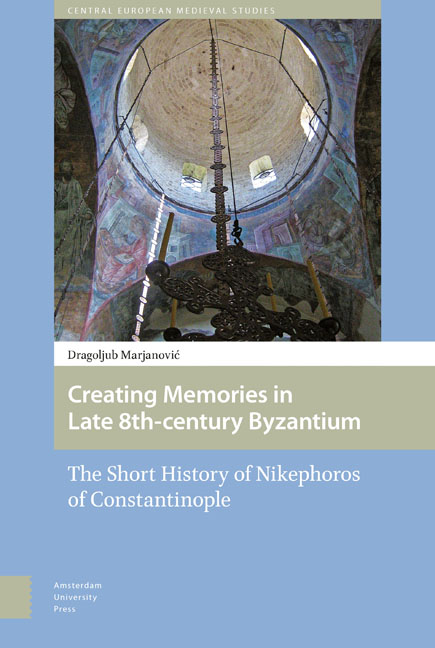Book contents
- Frontmatter
- Contents
- List of Tables
- Preface
- Introduction
- 1 Nikephoros the Layman
- 2 The Short History in the Byzantine Historiographical Tradition
- 3 Herakleios: Model of an Emperor
- 4 The Dark Century
- 5 Iconoclasts Restoring Order
- Conclusion: In Search of an Ideal Image of an Emperor
- Glossary
- Abbreviations
- Bibliography
- Index
1 - Nikephoros the Layman
Published online by Cambridge University Press: 11 December 2020
- Frontmatter
- Contents
- List of Tables
- Preface
- Introduction
- 1 Nikephoros the Layman
- 2 The Short History in the Byzantine Historiographical Tradition
- 3 Herakleios: Model of an Emperor
- 4 The Dark Century
- 5 Iconoclasts Restoring Order
- Conclusion: In Search of an Ideal Image of an Emperor
- Glossary
- Abbreviations
- Bibliography
- Index
Summary
According to Ignatios the Deacon, the author of the Short History was the son of pious parents, Theodore and Eudokia, and he was a born Constantinopolitan. Patriarch Photios, who wrote in the second half of the ninth century, claimed that Nikephoros was related to the Patriarch Tarasios. In one of his letters to Pope Nicholas I, Photios wrote:
Thus, through us, with us, and because of us, the holy blessed fathers are under threat to be slandered, like Tarasios and Nikephoros, our kin (οἵ τῆς ϰαθ’ ἡμᾶς γϵνϵᾶς), the perpetual glowing lights. Namely, they became loud predicants of pious ways, stepping on to the highest priestly office in the same manner, from the laity, strengthening the truth by their life and word – I thought that it should be added to this word – presenting these blessed men as better than any condemnation, and higher than any slander […] such were Tarasios and Nikephoros, stars which glow with justice in this earthly life; they were elected for this sacred service, and they brought forward the rule and model of the Church.
Further, for Patriarch Photios, who himself had to defend his patriarchal ordination before the pope, Tarasios and Nikephoros were not only his kin, as he pointed out in the letter to Nicholas I, but also ‘firm guardians of the rules, defenders of piety, torchbearers when the word of godly science and life was attacked in this world’ (οὗτοι γὰρ τῶν ϰανόνων ἀϰριβϵῖς φύƛαϰϵς, τῆς ϵὐσϵβϵίας ὑπέρμαχοι, τῆς δυσσϵβϵίας ϰατήγοροι, φωστῆρϵς ἐν ϰόσμῳ ϰατὰ τὸ θϵῖον ƛόγιον ƛόγον ζωῆς ἐπέχοντϵς). Photios further emphasized that Nikephoros was not only Tarasios's worthy successor on the patriarchal throne but also his relative, and thus Photios's relative as well.
The exact year of Nikephoros's birth cannot be precisely determined according to his Life by Ignatios, although it can be supposed that he was born sometime during the reign of the Emperor Constantine V (741-775). Nikephoros's father Theodore obviously belonged to court aristocratic circles, since at one time he served as a secretary at the court of Constantine V.5 However, the Iconoclasm of the emperor did not prevent Theodore from firmly confessing his strong adherence to icons in the presence of the emperor himself.
- Type
- Chapter
- Information
- Creating Memories in Late 8th-century ByzantiumThe Short History of Nikephoros of Constantinople, pp. 19 - 64Publisher: Amsterdam University PressPrint publication year: 2017



